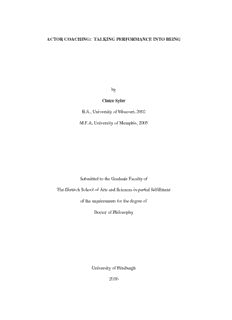Table Of ContentACTOR COACHING: TALKING PERFORMANCE INTO BEING
by
Claire Syler
B.A., University of Missouri, 2002
M.F.A, University of Memphis, 2005
Submitted to the Graduate Faculty of
The Dietrich School of Arts and Sciences in partial fulfillment
of the requirements for the degree of
Doctor of Philosophy
University of Pittsburgh
2016
i
UNIVERSITY OF PITTSBURGH
THE DIETRICH SCHOOL OF ARTS AND SCIENCES
This dissertation was presented
by
Claire Syler
It was defended on
May 6, 2016
and approved by
Dr. Ellice Forman, Professor, Department of Instruction and Learning
Dr. Michelle Granshaw, Assistant Professor, Department of Theatre Arts
Dissertation Co-Advisor: Dr. Bruce McConachie, Professor Emeritus, Department of Theatre
Arts
Dissertation Co-Advisor: Dr. Jennifer Waldron, Associate Professor, Department of English
ii
Copyright © by Claire Syler
2016
iii
ACTOR COACHING: TALKING PERFORMANCE INTO BEING
Claire Syler, PhD
University of Pittsburgh, 2016
What does it mean to coach actor(s) on a monologue or scene? Directors and teachers of acting
have long referred to the practice of “actor coaching,” yet, despite an omnipresence in the field,
there is virtually no theorization of the activity. So, how do coaches use language, dramatic text,
and embodiment to communicate knowledge and develop performance? This study forges an
interdisciplinary framework that uses theatre and performance studies scholarship and
Vygotskian-based sociocultural learning theory, a subfield of the learning sciences, to examine
the multimodal talk of a seasoned acting instructor over the course of a university-level acting
class. Employing ethnographic methods, data drew from observations, written fieldnotes,
analytical memos, interviews with the participants, and roughly twenty-five hours of digital
video footage, which formed the chief data set. To examine the video corpus, and to locate the
instructor’s coaching register, the study relied on interaction analysis, sociolinguistic methods of
register analysis, and prior research on the language of sports coaching. Analyzing the
instructor’s talk, as it emerged over time and interactivity, revealed four gross registers of actor
coaching, which were enacted in varying participatory frames and coalesced to create implicit
participatory norms. In turn, these norms served to reduce the asymmetrical power dynamics
inherent in actor coaching and teaching, reify the constitutive ‘rules’ of realistic performance,
and cultivate dialogic interactions that required a partial perspective taking from the coach,
character, and/or student standpoint. Linguistic analysis of the coaching register yielded a
iv
repertoire of discursive moves (questions of knowing, eventcasts, telegraphic utterances) the
instructor contingently issued to challenge and develop performance, as well as maintain student
motivation. Functionally, actor coaching demanded the student reside within a space of public
attention, communicational interplay, affect, metacognition, performance, and revision. The
study concludes by theorizing actor coaching as situated in cultural-historical settings that
privilege particular performance traditions and texts, dialogically dependent upon
communicative interaction and co-perspective taking, and guided by a coach’s scaffolded
language use. As a theory-building project, the study suggests that actor coaching is a significant
disciplinary resource for theatre studies and worthy of future analysis.
v
TABLE OF CONTENTS
PREFACE .................................................................................................................................... XI
1.0 INTRODUCTION ........................................................................................................ 1
2.0 REVIEW OF THE LITERATURE .......................................................................... 13
2.1 PERFORMANCE INSTRUCTION IN U.S. LIBERAL ARTS SETTINGS 14
2.2 SOCIOCULTURAL THEORIES OF LEARNING AND DISCOURSE ..... 26
2.2.1 Classroom Discourse ..................................................................................... 31
2.2.2 Register Studies and Coaching ..................................................................... 36
2.2.3 Scaffolding ...................................................................................................... 40
2.3 COMMON FRAME .......................................................................................... 44
3.0 METHODS ................................................................................................................. 47
3.1 ETHNOGRAPHIC METHODS AND CASE STUDY RESEARCH ........... 48
3.2 OVERVIEW OF DATA COLLECTION METHODS .................................. 56
3.2.1 Course Setting and Participants ................................................................... 57
3.2.2 Additional Data Sources ............................................................................... 62
3.3 OVERVIEW OF DATA ANALYSIS METHODS ......................................... 69
3.3.1 Content Logs and Situational Analysis ........................................................ 71
3.3.2 Transcription and Pervasive Language Features ....................................... 76
3.3.3 Functional Analysis ....................................................................................... 81
vi
4.0 FINDINGS: PROFESSOR D’S COACHING REGISTER ................................... 82
4.1 SITUATIONAL ANALYSIS: COMMUNICATIVE DESCRIPTIONS AND
TEXT SAMPLES ............................................................................................................... 83
4.1.1 Call-and-Response Coaching ........................................................................ 84
4.1.2 Stop/Start Ensemble Coaching ..................................................................... 87
4.1.3 Stop/Start Actor Coaching ............................................................................ 90
4.1.4 Side Coaching ................................................................................................. 93
4.1.5 Organizational Aspects of Professor D’s Coaching Register ..................... 95
4.2 DESCRIPTION OF PROFESSOR D’S PERVASIVE LANGUAGE
FEATURES ......................................................................................................................... 99
4.2.1 Language Genres: Metacomments, Questions of Knowing, and Eventcasts
....................................................................................................................... 100
4.2.2 Language Features: Syntactic Features of Coaching ............................... 108
4.2.3 Integrating the Pervasive Language Features of Professor D’s Coaching
Register...................................................................................................................... 115
4.3 FUNCTIONAL ANALYSIS OF THE ASSOCIATIONS BETWEEN THE
SITUATIONAL CONTEXT, LANGUAGE FEATURES, AND LEARNING ........... 119
5.0 DISCUSSION ........................................................................................................... 132
5.1 REVIEW OF THE STUDY: SUMMARY OF FINDINGS &
LIMITATIONS ................................................................................................................. 132
5.2 IMPLICATIONS FOR FURTHER RESEARCH ........................................ 147
5.2.1 New Directions for the Study of Actor Coaching ..................................... 148
6.0 COACHING AS A DISCIPLINARY RESOURCE .............................................. 152
vii
6.1 FINAL REFLECTIONS ................................................................................. 157
APPENDIX A ............................................................................................................................ 159
APPENDIX B ............................................................................................................................ 161
APPENDIX C ............................................................................................................................ 164
APPENDIX D ............................................................................................................................ 166
BIBLIOGRAPHY ..................................................................................................................... 168
viii
LIST OF TABLES
Table 1. A Portion of a Content Log from Class 2 ....................................................................... 72
Table 2. Transcript from Class 11 (June 16, 2015)....................................................................... 94
Table 3. Event Map of Professor D’s Participation Frameworks ................................................. 96
Table 4. Transcript from Class 7 (June 2, 2015)........................................................................ 104
Table 5. Transcript from Class 11 (June 16, 2015).................................................................... 106
Table 6. Transcript from Class 7 (June 2, 2015)......................................................................... 116
Table 7. Transcript from Class 7 (June 2, 2015)......................................................................... 126
Table 8. Transcript from Class 7 (June 2, 2015)......................................................................... 128
Table 9. A General Overview of Professor D’s Coaching Register ........................................... 143
ix
LIST OF FIGURES
Figure 1: Photographs of the Performance Classroom ................................................................. 58
Figure 2. Organizing Features of Actor Coaching ...................................................................... 149
x
Description:interdisciplinary framework that uses theatre and performance studies .. Acting for Non-Majors or Introduction to Performance, tend to fulfill two as a whole, posit that learning from several forms of general knowledge is an .. However, by midcentury, theatre historian Marvin Carlson notes, “the

